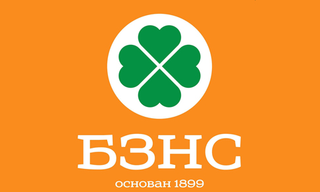 |
|---|
| This article is part of a series on the politics and government of Bulgaria |
Presidency |
|
Parliamentary elections were held in Bulgaria on 21 June 1931. [1] The result was a victory for the Popular Bloc, an alliance of the Bulgarian Agrarian National Union (Dragiev), the Democratic Party, the National Liberal Party (Petrov) and the Radical Democratic Party, which won 151 of the 273 seats. Voter turnout was 85.2%. [2]

Bulgaria, officially the Republic of Bulgaria, is a country in Southeast Europe. It is bordered by Romania to the north, Serbia and North Macedonia to the west, Greece and Turkey to the south, and the Black Sea to the east. The capital and largest city is Sofia; other major cities are Plovdiv, Varna and Burgas. With a territory of 110,994 square kilometres (42,855 sq mi), Bulgaria is Europe's 16th-largest country.

Bulgarian Agrarian National Union also translated to English as Bulgarian Agrarian People's Union is a political party devoted to representing the causes of the Bulgarian peasantry. It was an agrarian movement and was most powerful between 1900 and 1923. Unlike the socialist movements of the early 20th century, it was devoted to questions concerning agriculture and farm workers, rather than industry and factory workers. The BZNS, one of the first and most powerful of the agrarian parties in Eastern Europe, dominated Bulgarian politics during the beginning of the 20th century. It is also the only agrarian party in Europe that ever came to power with a majority government, rather than merely as part of a coalition. It is a founding member of the former International Agrarian Bureau.
The Democratic Party is a center-right party in Bulgaria led by Alexander Pramatarski. The party is a member of the European People's Party (EPP).
This would be the last officially partisan election held in Bulgaria before World War II (the 1939 elections were officially nonpartisan, but candidates representing parties ran as individuals). By the time of the next elections in which parties were formally allowed to take part, in 1945, the country had been through two dictatorships and a third, Communist one was rapidly consolidating. [3] As a result, the 1931 election was also the last free election held in the country until 1990.

World War II, also known as the Second World War, was a global war that lasted from 1939 to 1945. The vast majority of the world's countries—including all the great powers—eventually formed two opposing military alliances: the Allies and the Axis. A state of total war emerged, directly involving more than 100 million people from over 30 countries. The major participants threw their entire economic, industrial, and scientific capabilities behind the war effort, blurring the distinction between civilian and military resources. World War II was the deadliest conflict in human history, marked by 50 to 85 million fatalities, most of whom were civilians in the Soviet Union and China. It included massacres, the genocide of the Holocaust, strategic bombing, premeditated death from starvation and disease, and the only use of nuclear weapons in war.






